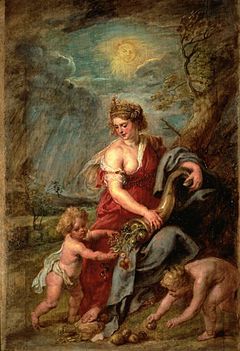Ops: Difference between revisions
m Reverted edits by 222.155.186.118 to last revision by Metodicar (HG) |
Let's be an encyclopedia. :o) |
||
| Line 2: | Line 2: | ||
{{Roman myth (rustic)}} |
{{Roman myth (rustic)}} |
||
'''Ops''', more properly '''''Opis''''', ([[Latin]]: "Plenty") was a fertility deity and earth-goddess in [[Roman mythology]] of [[Sabine]] origin. |
'''Ops''', more properly '''''Opis''''', ([[Latin]]: "Plenty") was a fertility deity and earth-goddess in [[Roman mythology]] of [[Sabine]] origin. |
||
[[Image:Rubens Abundance.jpg|thumb|left|240 px|[[Peter Paul Rubens]]: Ops with two |
[[Image:Rubens Abundance.jpg|thumb|left|240 px|[[Peter Paul Rubens]]: Ops with two children]] |
||
==Life== |
==Life== |
||
Her husband was [[Saturn (mythology)|Saturn]], the bountiful monarch of the [[golden age|Golden Age]]. Just as Saturn was identified with the Greek deity [[Cronus]], Ops was identified with [[Rhea (mythology)|Rhea]], Cronus' wife. In her statues and coins, Ops is figured sitting down, as [[chthonic|Chthonian]] deities normally are, and generally holds a [[scepter]] or a [[wheat|corn]] spike as her main attributes. The Chthonian deities are the manifestations of the [[Great Goddess]], such as [[Gaia]] or [[Gaia (mythology)|Ge]]. |
Her husband was [[Saturn (mythology)|Saturn]], the bountiful monarch of the [[golden age|Golden Age]]. Just as Saturn was identified with the Greek deity [[Cronus]], Ops was identified with [[Rhea (mythology)|Rhea]], Cronus' wife. In her statues and coins, Ops is figured sitting down, as [[chthonic|Chthonian]] deities normally are, and generally holds a [[scepter]] or a [[wheat|corn]] spike as her main attributes. The Chthonian deities are the manifestations of the [[Great Goddess]], such as [[Gaia]] or [[Gaia (mythology)|Ge]]. |
||
Revision as of 09:26, 28 March 2009
| Part of a series on |
| Roman mythology |
|---|
| Major gods |
| Topics |
| Other minor Roman deities |
|
|
Ops, more properly Opis, (Latin: "Plenty") was a fertility deity and earth-goddess in Roman mythology of Sabine origin.

Life
Her husband was Saturn, the bountiful monarch of the Golden Age. Just as Saturn was identified with the Greek deity Cronus, Ops was identified with Rhea, Cronus' wife. In her statues and coins, Ops is figured sitting down, as Chthonian deities normally are, and generally holds a scepter or a corn spike as her main attributes. The Chthonian deities are the manifestations of the Great Goddess, such as Gaia or Ge.
In Latin writings of the time, the singular nominative (Ops) is not used; only the form Opis is attested by classical authors. According to Festus (203:19), "Ops is said to be the wife of Saturn. By her they designated the earth, because the earth distributes all goods to the human genus" (Opis dicta est coniux Saturni per quam uolerunt terram significare, quia omnes opes humano generi terra tribuit). The Latin word ops means "riches, goods, abundance, gifts, munificence, plenty". The word is also related to opus, which means "work", particularly in the sense of "working the earth, ploughing, sowing". This activity was deemed sacred, and was often attended by religious rituals intended to obtain the good will of chthonic deities such as Ops and Consus. Ops is also related to the Sanskrit word ápnas ("goods, property").
The cult of Ops was (mythically) instituted by King Titus Tatius, the Sabine monarch. Ops soon became the patroness of riches, abundance, and prosperity, both on a personal and national level. Ops had a famous temple in the Capitolium. Originally, a festival took place in Ops' honor on August 10. Additionally, on December 19 (some say December 9), the Opalia was celebrated. On August 25, the Opiconsivia was held. Opiconsivia was another name used for Opis, indicating when the earth was sown. These festivals also included activities that were called Consualia, in honor of Consus, her consort.
Opis not only being the wife of Saturn, she was his sister and the daughter of Caelus. Her children were Jupiter, Neptune, Pluto, Juno, Ceres and Vesta. Opis also acquired queenly status and was reputed to be an eminent goddess and the Mother of the Gods. By public decree temples, priests, and sacrifices were accorded her. There was even an oddly shaped stone that was procured from Pessinus that represented Opis. It was put in the famous temple in Rome and worshiped by the Romans for a long time in numerous ceremonies.
References
Primary sources
- Livy Ab urbe condita libri XXIX.10.4-11.8, 14.5-14
- Lactantius, Divinae institutions I.13.2-4, 14.2-5
Secondary sources
- This article incorporates text from a publication now in the public domain: Chisholm, Hugh, ed. (1911). Encyclopædia Britannica (11th ed.). Cambridge University Press.
{{cite encyclopedia}}: Missing or empty|title=(help) - Virginia Brown's translation of Giovanni Boccaccio’s Famous Women, p. 12 - 13; Harvard University Press 2001; ISBN 0-674-01130-9
